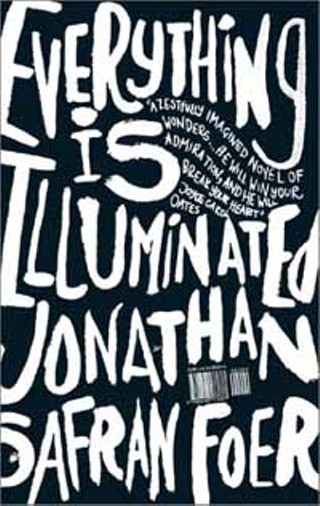Book Review
Jonathan Safran Foer's 'Everything Is Illuminated' has appeared under an unusually beneficent conjunction of stars for a debut novelist. The first chapter was excerpted in 'The New Yorker'. The book was featured on the very cover of 'The New York Times Sunday Book Review'. Reviewer Roger Gathman explains why all the fuss is being made.
By Roger Gathman, Fri., April 26, 2002

Everything Is Illuminated
by Jonathan Safran FoerHoughton Mifflin, 276 pp., $24 The American search for roots is a form of magical realism all by itself. Jonathan Safran Foer's fictionalized account of his particular roots quest, in the boondocks of the Ukraine, for the shtetl from which his grandfather barely escaped the Nazi killing machine in 1941, uses both the folkish idiom of Scholem Aleichem and the surreal layering of Bruno Schulz to convey the comedy of return. This is comedy touched with a darkness at the end, however -- the endless tunnel of the Shoah.
The book is divided between two times and two voices. The first is historic time, told in the historic eternal, and relating the mock heroic epic of the village of Trachimbrod from 1791 to 1941. At the former date, a baby girl was rescued from a stream, like Moses, and raised by the scholarly, though much vilified, village userer. Her blood flows in the Safran line, down to the 1930s, when Grandfather Safran's precocious penis becomes the marvel of the village, the hope of widows and lonely housewives. Who are killed, en masse, by the Einsatzgruppe, the German mobile killing squad, in 1941. Grandfather Safran was rescued from the slaughter by a woman named Augustine. Jonathan, in the hopes of finding this Augustine, by now surely an old woman, arrives in the Ukraine in our post-Shoah times and hires a guide. In the novel's second time, we get an account of Jonathan's goose chase, and much else, from the exuberantly non-English speaking Alex, Jonathan's "premium" Ukrainian guide. Between the letters that Alex writes back to Jonathan, as he reviews the story Jonathan is writing and sending to Alex, and the story of Trachimbrod, Foer has created one of those Escher-like narratives, where the hand draws itself.
The Alex bits rely heavily on the humor of Alex's mangled, thesaurus-enriched English. Your reviewer is a sucker for the dubious joys of making fun of non-native English. I can't help but laugh at passages like this. Alex has taken Jonathan to a hotel in Lusk, and they are sitting down getting to know each other:
"What about the girls in America?" "What about them?" "They are very informal with their boxes, yes?" "You hear about them, but nobody I know has ever met one of them." "Are you carnal very often?" "Are you?" "I inquired you. Are you?"
Etc.
Of course, Alex catches his own mistakes but renders Jonathan's replies in standard English -- one of those sacrifices of life to art, like making the Germans in a war movie speak accented English. Still, this kind of thing can go a surprisingly long way.
Foer's book has appeared under an unusually beneficent conjunction of stars for a debut novelist. The first chapter was excerpted in The New Yorker. The book was featured on the very cover of The New York Times Sunday Book Review. Besides being anointed by Oprah (a ritual which seems to be nearing its end), there is no position more coveted by the literati. So is it equal to its hype? Critics wouldn't be critics if they weren't extremely envious and resentful, so my worse side would love to diss this novel ... but I can't. It does run on empty, a bit, at the end. The coincidence that joins Jonathan's family to Alex's is disappointingly melodramatic. The emergence of a plain-speaking Alex at the end of the novel is a disappointment. But, really, this is a wonderful debut. Yes, yes, yes, he sighed. I understand why all the fuss is being made about it.








